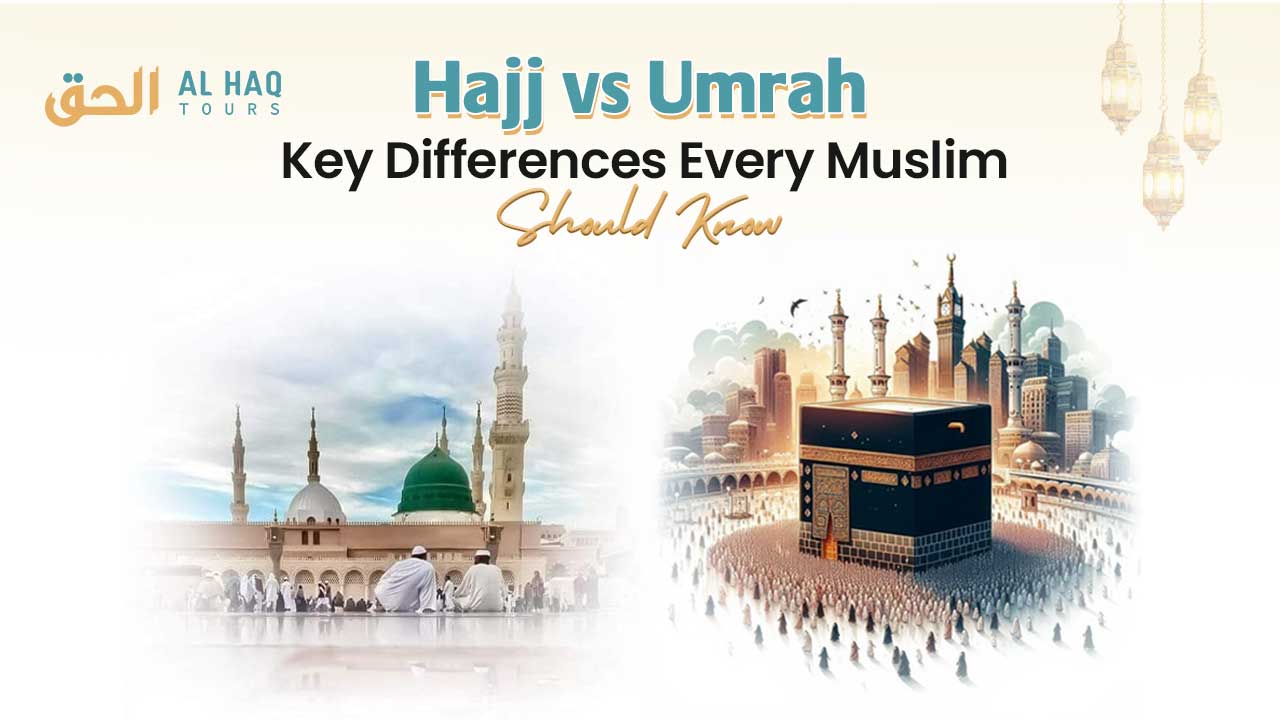Introduction: Understanding the Difference Between Hajj and Umrah
Hajj and Umrah are religious tours to perform rituals at specific sites in Makkah. Both are undertaken by Muslims to earn immense spiritual merits. However, Hajj and Umrah are two different pilgrimages with a varying purpose of visit, significance, duration, performance and religious nature. But how Umrah exactly differ from Hajj? Which one you should perform depending on budget limitations? Here is a comprehensive guide covering your concerns about both these pilgrimages. So, let's read ahead.
What is the difference between Hajj and Umrah?
Performing Hajj and Umrah is a symbolic act of worship that shows the spirit and love of pilgrims towards their religious responsibility. It's a highly admirable practice in Islam that Muslims leave their routine tasks to make the pilgrimage happen as the desire of visiting the sacred Kaaba is a part of the believer's nature. However, the decision of getting started with pilgrimage begins with the understanding of Hajj and Umrah. So, let's compare each to end up knowing which one is your go-to option right now.
Hajj vs umrah
Hajj is an annual gathering of Muslims in Makkah during the last Islamic month that promotes the sense of humility, unity and brotherhood. Around two billion of Muslims from more than 188 countries gather to perform Hajj wearing the same clothes, doing the same rituals and reciting Talbiyah. Hajj is one of the five pillars of Islam and is mandatory to perform once in a life for every Muslim who is able to do it and can afford it also.
An umrah is an all time gathering of Muslims around the Kaaba aiming to please Allah during the days other than Hajj. An umrah pilgrimage is not an obligatory practice in Islam yet highly recommended by the Holy Prophet who performed it four times in his life. It's a voluntary effort of believers who want to gain divine mercy and seek forgiveness for their sins. It's also a popular choice among Muslim community due to its affordable nature and shorter duration.
Key rituals
Performing pilgrimage needs a sincere focus on the purpose of each act and complete it the right way. And it all starts from the deep understanding of the rituals involved in each pilgrimage and the way to perform it right. For example, both Hajj and Umrah have some rituals in common like Tawaf, walking between Safa and Marwa and cutting or shaving hair as a sign of getting out of Ihram.
However, Hajj has some additional rituals to perform at specific holy landmarks like stay in Mina, wuquf in the plain of Arafat, spending night at Muzdalifah, and throwing stones at Jamarat. Hajj also involves sacrificing the animals for the sake of Allah which develops inner gratitude about the completion of the major pilgrimage.
Duration and complexity
The Hajj lasts for about five to six days in the Makkah while performing the specific rites and rituals during each day. The time to perform each act is highly specific and fixed for everyone. It's a longer pilgrimage involving multiple rituals to perform correctly.
On the other side, an umrah is a shorter pilgrimage you can complete in a few hours. There are no time restrictions to perform Umrah as you can plan Umrah pilgrimage anytime in the year and anytime during the day. It also involves simpler and fewer rituals to perform nearby Kaaba.
Cost of pilgrimage
The cost of Hajj and Umrah varies depending on the factors such as the country in which you live, the type of package you tend to choose, time of the year, and other preferences. For example, the cost of pilgrimage for US citizens would be different than those living in the UK or any other country. The best way to know the exact cost is to contact any local travel agency out there and get recommendations as per your interest.
In general, estimating the total cost of each pilgrimage gives an idea of the entire expenses. For example, aHajj is a longer pilgrimage and features multiple rituals, it requires extra expenses for transportation and accommodation during the longer stay than Umrah. Not just this, the Hajj season is also a peak travel period of the year which increases the prices of flights, hotels and other services.
On other hand, Umrah is a flexible journey you can plan anytime. It involves fewer rituals and lesser transportation expenses that you can also arrange independently. To facilitate your pilgrimage needs, there are also a variety of Hajj and Umrah packages available locally to serve you at best.
Frequency and significance
Performing Hajj is not mandatory for Muslims until they are able to perform it both financially and physically. If capable, one can perform Hajj once in a year. However, successfully completing Hajj is a significant accomplishment in Islam bringing manifold rewards in the afterlife.
On the other side, pilgrims can perform Umrah as many times as they can. Also, there's no restriction of time as one can perform it anytime except during Hajj days. Similarly, performing Umrah is an act of spiritual renewal and purification for the soul. It also brings pilgrims closer to Allah where they are served as his guests.
Reward and Blessings
Both Hajj and Umrah also differs in terms of rewards and blessings each brings to pilgrims. For example, performing Hajj is an obligation for Muslims who are eligible of undertaking this journey. Therefore, no act of worship can be similar to an accepted Hajj (Hajj Mabrur) as it erases all the sins of a performer.
On the other hand, an Umrah is a voluntary Ibadah and a Sunnah too that earns massive rewards and blessings. Even an Umrah in Ramadan earns a reward equal to Hajj. However, it doesn't eliminate the need of performing Hajj for eligible Muslims and also can't replace the importance of Hajj in Islam. But still, it's a great option of getting closer to Allah anytime during the year.
Hajj vs Umrah - Which one you should perform?
As you see both Hajj and Umrah are distinct acts of Ibadah each with a defined purpose and intention. So, not any one can replace the other but it's your budget, spiritual goals and time of year that decides what should you perform first. So here are some factors to consider before planning any of the pilgrimage this year.
Check your religious duty and time of year
Hajj is a major pilgrimage in islam and also represents its fifth important pillar. However, it's not obligatory for everyone to perform but only for those who have all the means to afford it. So, check out if you are eligible for performing Hajj. For example, consider if you can afford all the expenses of Hajj or are you able to perform it healthily.
If yes, you should definitely plan a Hajj pilgrimage this time. Similarly, if you are planning a pilgrimage in the beginning of Islamic year or even in Ramadan, the option of performing Umrah is there for you.
Look at your budget
The reason why Hajj isn't obligatory for everyone is the varying budget of the major pilgrimage as compared to Umrah. For example, Hajj pilgrimage is far more expensive than Umrah as it involves longer stay in Haramain and the greater expenses of transportation and accommodation during the peak season. Even it also involves sacrificing animals for the sake of Allah that not everyone can afford. So, check out if you can afford all these expenses easily. However, if you are on a budget but still looking for a spiritual boost, Umrah is the right fit for you right now. If you want to book affordable Umrah packages to plan your journey within your budget.
Be honest about your health
What if you can afford all the expenses of Hajj but have health limitations? Well, planning Hajj isn't an obligation for you in this case. This is because the Hajj pilgrimage isn't just expensive to afford but also demands good physical health and stamina. It requires good health to walk longer, perform rituals for days and consider camping at different sites. On the other hand, Umrah is a shorter pilgrimage and is a matter of a few hours that everyone can afford. So, plan your Hajj journey only when you can perform all its rituals healthily. Otherwise, Umrah is the right option to go with.
Think about the crowds
Hajj days are the busiest days in terms of travel demand and the level of crowds in Haramain. On the other hand, one can also perform umrah during off-peak seasons of a year other than Ramadan and December. This is the time when crowds of pilgrims are smaller and performing rituals becomes easier for everyone. So, if you are planning a pilgrimage for the first time, start with performing Umrah first. It's the best way of understanding the rituals and the patterns about how living in Haramain feels like. However, frequent travelers can definitely plan Hajj pilgrimage once they become eligible for it both physically and financially.
Final Words
In conclusion, Hajj and Umrah are two distinct pilgrimages in terms of purpose and intention. One is obligatory for only those who can afford it both physically and financially and the other is voluntary that everyone can perform anytime in a year except during Hajj days. To decide which should you perform right next, consider your budget, health, spiritual goals and the time of year. We hope that you'll get the answer to all your questions related to Hajj vs Umrah by the end of this post.





.jpg)





